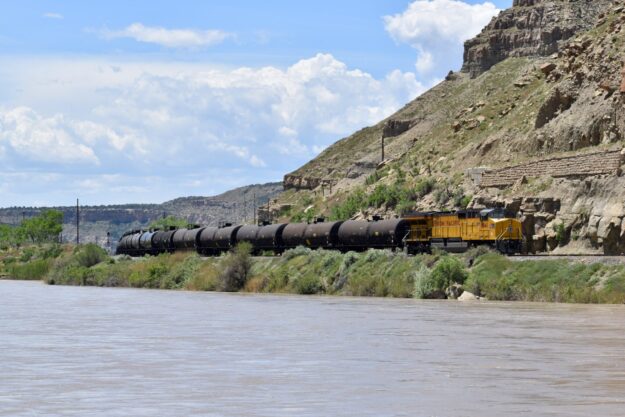Widgetized Section
Go to Admin » Appearance » Widgets » and move Gabfire Widget: Social into that MastheadOverlay zone
Eagle County, green groups urge BLM officials to conduct full environmental review of oil-train expansion

A Union Pacific train travels along the Colorado River near Cameo on May 16, 2023. (Chase Woodruff/Colorado Newsline)
Colorado’s Eagle County and a coalition of environmental groups are urging the federal Bureau of Land Management to undertake a full review of the proposed expansion of an oil-train terminal in eastern Utah.
Owned by Utah’s largest oil producer, the Wildcat Loadout Facility near Price, Utah, has been used in recent years to transport limited amounts of crude oil by rail through Colorado to refineries along the Gulf Coast. The exported oil is currently trucked to the terminal from the Uinta Basin, the oil-rich region to the northeast, before being loaded into rail tank cars.
The terminal’s expansion is viewed by conservation groups as a potential interim or backup measure in connection to the proposed Uinta Basin Railway, the multibillion-dollar public-private partnership that aims to build a new 88-mile railroad to connect the region to the existing Union Pacific line near Price. That proposal has drawn fierce opposition from many in Colorado, including Eagle County, which has sued the Biden administration to reverse its approval.
In a letter sent Thursday to Greg Sheehan, the BLM’s Utah state director, attorneys representing the county wrote that it has “similar concerns” about the expansion of the Wildcat terminal.
The facility’s owners have applied to the agency for a permit to increase its capacity to 100,000 barrels of crude oil per day. That’s less than half of the projected capacity of the Uinta Basin Railway, but more than triple the terminal’s current throughput.
“(The) proposal to expand the Facility’s capacity to transload Uinta Basin waxy crude oil by more than 230% would result in significant local, regional, and national impacts,” Eagle County’s attorneys wrote. “For communities downline of the Facility, including those located in Eagle County, this includes increasing the risk of oil train-related congestion, accidents, environmental hazards, and social and economic impacts.”
The BLM has initiated proceedings for an “environmental assessment” of the Wildcat expansion under the National Environmental Policy Act. Such analyses are much more abbreviated than environmental impact statements for large projects, which can involve years of study and public feedback.
Eagle County’s letter argues that the potential impacts of the expansion, including downstream effects on greenhouse gas emissions, demand a full EIS process.
“In light of the significant regional and national impact and the short- and long-term environmental effects of the proposed Facility, Eagle County requests that BLM prepare a full EIS to properly evaluate the potential significant environmental impacts, fully understand those impacts, and adequately inform the public regarding the proposed Facility,” says the letter.
In a separate letter to Sheehan earlier this week, a coalition of 15 environmental groups, including several that have joined Eagle County in suing to block the Uinta Basin Railway, echoed the county’s EIS request.
“Because the Wildcat Loadout right-of-way amendment will have significant impacts upstream in the Uinta Basin … and downstream in Colorado and beyond,” the groups wrote, “BLM must prepare an EIS.”
Editor’s note: This story first appeared on Colorado Newsline, which is part of States Newsroom, a network of news bureaus supported by grants and a coalition of donors as a 501c(3) public charity. Colorado Newsline maintains editorial independence. Contact Editor Quentin Young for questions: info@coloradonewsline.com. Follow Colorado Newsline on Facebook and Twitter.


